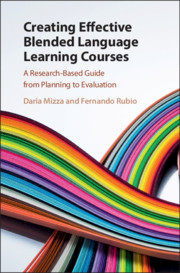 Creating Effective Blended Language Learning Courses
Creating Effective Blended Language Learning Courses Definitions and Research
from Part I - Theoretical Background
Published online by Cambridge University Press: 18 September 2020
Chapter 1 compares the curricular roles of technology in different language courses: Web-facilitated or -enhanced, blended, and fully online. The chapter also provides definitions of the term blended and a rationale for its adoption. In addition, Chapter 1 reviews comparative and noncomparative research studies conducted in the field in order to describe the conditions for effectively blending language environments. The review of research presented proves that blended learning (BL) in language education cannot be considered a monolithic enterprise and that there are currently as many different models – and divergent results – as there are programs or instructors implementing them.
To save this book to your Kindle, first ensure no-reply@cambridge.org is added to your Approved Personal Document E-mail List under your Personal Document Settings on the Manage Your Content and Devices page of your Amazon account. Then enter the ‘name’ part of your Kindle email address below. Find out more about saving to your Kindle.
Note you can select to save to either the @free.kindle.com or @kindle.com variations. ‘@free.kindle.com’ emails are free but can only be saved to your device when it is connected to wi-fi. ‘@kindle.com’ emails can be delivered even when you are not connected to wi-fi, but note that service fees apply.
Find out more about the Kindle Personal Document Service.
To save content items to your account, please confirm that you agree to abide by our usage policies. If this is the first time you use this feature, you will be asked to authorise Cambridge Core to connect with your account. Find out more about saving content to Dropbox.
To save content items to your account, please confirm that you agree to abide by our usage policies. If this is the first time you use this feature, you will be asked to authorise Cambridge Core to connect with your account. Find out more about saving content to Google Drive.